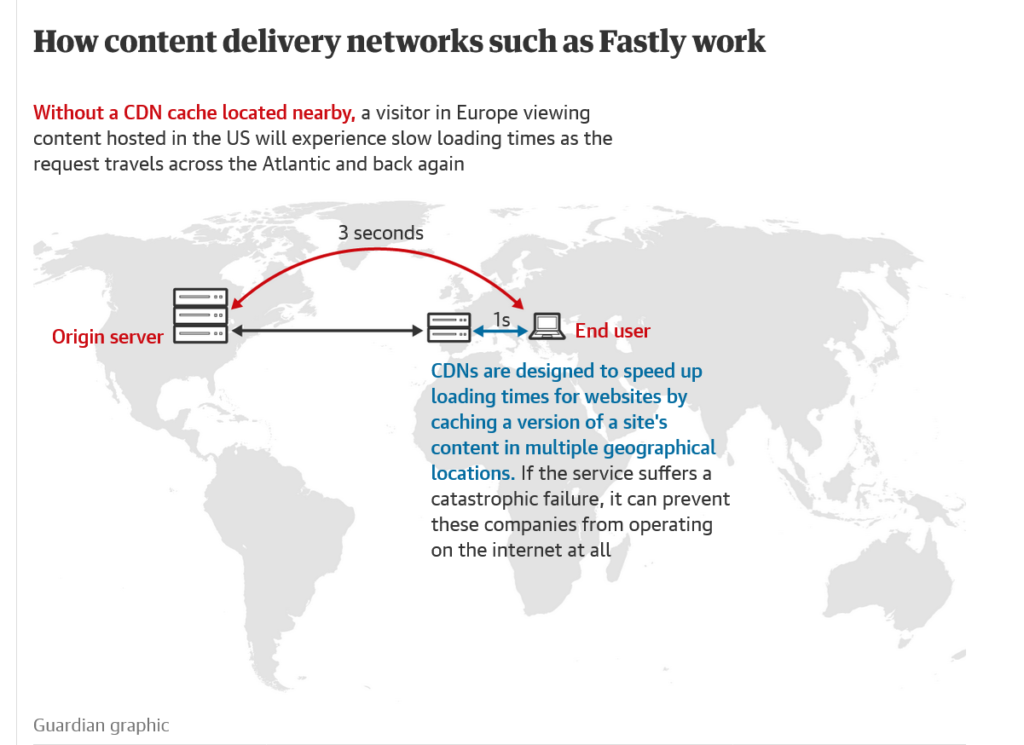A few days ago, heise.de ran the headline “The Internet is broken”, presumably driving the click rate per article to not inconsiderable heights. What happened? A bug in a “service configuration” at the cloud service provider Fastly triggered its network of server farms worldwide and led to cascading outages. For about an hour, websites worldwide using Fastly’s services were unavailable.
“Why should I care if some cloud provider has outages?” you may be asking yourself, and it’s possible that Fastly’s company doesn’t tell you anything. I certainly felt that way, so I did some research.
“Cloud storage undermines ‘fail-safe’ design of the internet,” reported the Irish Times, and the Guardian asked, “What caused the internet outage that brought down Amazon, Reddit and Gov.uk? Okay, this sounded like a bit more than “some cloud service provider.” In fact, Fastly is part of the oligopoly of a few U.S. cloud providers, such as AWS (formerly Amazon Web Services) or Microsoft Azure, among others, and manages about 10% of the world’s website traffic. Fastly’s customers include mostly large enterprises, not just Amazon, Reddit and the UK government, as mentioned above, but also Twitter, PayPal, Twitch, Slack, Spotify, Buzzfeed and Pinterest. Press organs such as the New York Times, Le Monde, Financial Times, Independent or The Guardian or even the video portal Vimeo also use Fastly’s server farms.
Cloud storage undermines “fail-safe” design of the Internet
Actually, the Internet was designed to be completely fail-safe. That’s also the criticism from the Irish Times. However, the trend to outsource as much as possible to “the cloud” created a need for speed to become more relevant. This growing need for speed on the Internet has led to a heavy concentration of Internet infrastructure in the hands of a few companies. The failure at Fastly not only illustrates the “power of the few”, but also vividly demonstrates the increased risk that comes with such concentration.
“The cloud” – also a marketing term
To define terms clearly at this point: When we talk about outsourcing data to “the cloud”, we are not referring to a single location – THE cloud does not exist, and the metaphorical term “cloud” somewhat obscures the fact that we are always talking about physical devices (servers) at some geographical location on this planet. However, the term “cloud” tends to suggest to non-technical people that it is something diffuse or non-material. That is, a cloud is neither a fluffy unicorn nor a meditative soft cotton ball. Storing data on other servers, on servers that are not physically present in my household, business or organization, invariably means surrendering control of that data.
CDN – Content Delivery Network
I basically get annoyed when the Internet doesn’t respond fast enough to my requests. I expect websites not to “build up”, but to be available to me virtually in real time. With the click of the Enter key I want to see results. I’m not really interested in the fact that my request may have to travel around the world or that the website I call up may contain myriads of content, including pictures and videos. Website operators are usually aware of my impatience and get help from the cloud hosts mentioned above. Service providers like Fastly offer so-called CDNs – Content Delivery Network Services.
As described above, it’s all about speed or performance. A website request from Germany to the UK takes longer than a request within Germany. Even if the difference is only milliseconds, the delay is there. A CDN service provider typically operates data centers around the world and keeps copies of popular content at geographic hubs to deliver the content to each region. These copies are then “closer” to the end user than the actual website. The experience for users can be up to ten times faster if a copy of the site (or elements of its content) can be held in Australia, for example, and delivered there when needed. So, to ensure fast delivery of content to everyone around the world, CDNs typically operate on a global scale.
Problems for enterprises
For businesses, a cloud service outage is a risk on multiple levels because the outage incurs costs:
The most obvious is if your website is directly affected – then possibly the web store is unavailable, which means immediate loss of revenue.
More indirectly, there are costs if your employees are dependent on internet usage, e.g.:
- Social media posts cannot be published as planned – possibly reducing the number of readers and thus the number of potential customers.
- Bank transfers are delayed, i.e. cash discount deduction may no longer be possible.
- The basis for decisions for important meetings cannot be prepared because relevant information is not available in time.
- The work of employees is generally hindered by a breakdown, i.e. work processes are delayed and deadlines are jeopardized.
- You have placed advertising banners and ads on various websites – with the temporary downtime of the sites, your opportunity to attract customers during this time is also lost.
Media analytics firm Kantarmedia estimated that in the Fastly outage of about an hour, about $29 million was lost worldwide in advertising revenue alone (source: arstechnica.com).
It is basically positive that cloud services exist, because in the ideal case they simplify processes and make them faster. They also save resources through efficient performance – at least there is the potential. Nevertheless, the following also applies in this area: A few providers increase dependencies, and the concentration of power promotes lack of freedom and inequality. Lack of freedom and inequality are enemies of democratic societies.
In this sense: There is always an alternative to the existing oligopolies. Decentralization and modularity are the terms of the hour – also applies to clouds.
For further reading:
https://t3n.de/news/software-bug-fastly-twitch-reddit-offline-1383710/
https://www.heise.de/news/Das-Internet-ist-kaputt-zahlreiche-Webseiten-down-6065217.html



